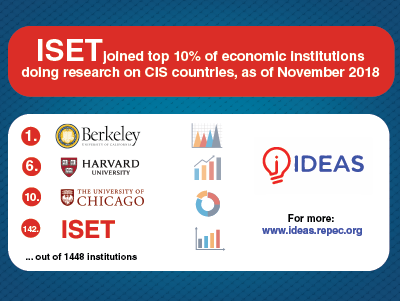ISET Joining the Top 10% Economic Institutions Worldwide Doing Research on CIS Countries
- Details

A decade after its founding, ISET celebrates its entry among the top 10% economic institutions worldwide doing research on CIS countries. In November 2018 IDEAS ranked ISET at the 142nd place out of the 1448 economic institutions in its database doing research on CIS countries. IDEAS is an international database that monitors publications in all fields of economics and ranks economic institutions around the world according to the visibility of their research i.e. how many times their online articles are viewed and downloaded.
The CIS field ranking is based on the number of views and downloads of papers analyzing economic issues in CIS countries. This explains why a number of Russian institutes are quite high in the ranking. The top three positions of the ranking are occupied, respectively, by: the Department of Economics of the University of California-Berkeley (USA), the Paris School of Economics (France) and the National Research University Higher School of Economics (Russia). ISET ranks immediately after the Faculty of Economic Sciences, Social Sciences and Management Sciences of the University of Namur (Belgium) and immediately above the Department of Economics, International Business School of the Brandeis University (USA).
ISET Resident Faculty Members Publish New Paper
- Details

ISET would like to congratulate resident faculty members Muhammad Asali, Norberto Pignatti and Sophiko Skhirtladze on the publication of their new article, entitled “Employment discrimination in a former Soviet Union Republic: Evidence from a field experiment” and published in the Journal of Comparative Economics. [NOTE: thanks to Elsevier, the paper will be downloadable for free until the 25th of January, clicking on the link provided]
The authors provide the first experimental evidence about ethnic and gender discrimination in the labor market of Georgia. They randomly assign Georgian, non-Georgian, male and female names to similar resumes and apply for jobs as advertised on help-wanted websites in Georgia, finding that gender has no effect on the probability of callback, but a job applicant who is ethnically Georgian is more than twice as likely to be called for a job interview than an equally skilled ethnic non-Georgian (Azerbaijani or Armenian). The authors find no evidence of gender discrimination in callbacks, both within the Georgian group and the non-Georgian group.










